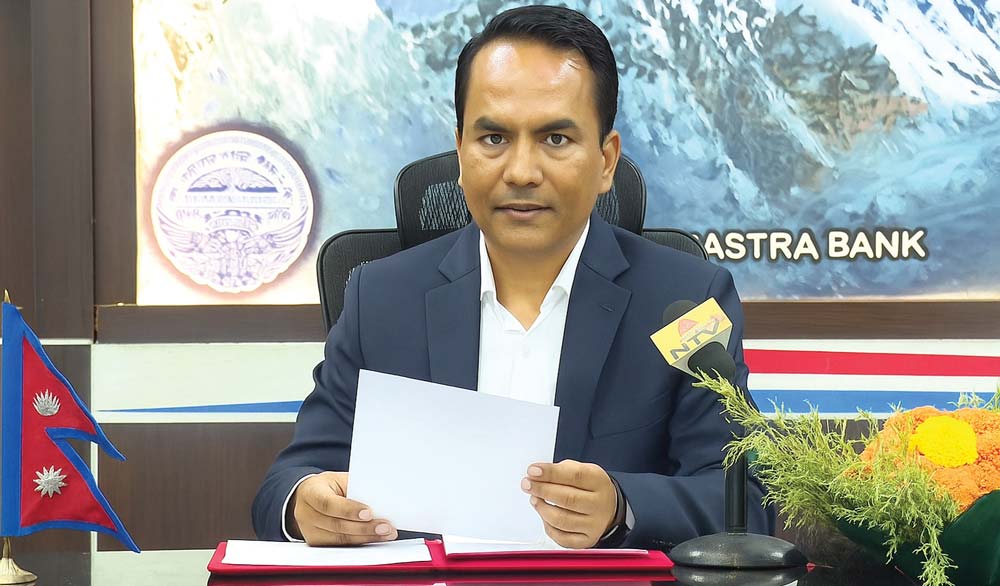
Nepal Rastra Bank Announces Monetary Policy FY 2082/83
Nepal Rastra Bank (NRB) has announced a flexible and accommodative monetary policy for the upcoming fiscal year 2082/83, concluding that while the economy remains sluggish, it is on a recovery path.
Governor Dr. Baikuntha Poudel presented the policy on Friday, focusing on the relaxed use of monetary tools, capital formation by the private sector, and support to troubled industries.
The policy reduces the bank rate from 6.5% to 6%, the deposit collection rate from 3% to 2.25%, and the policy rate from 5% to 4.5%.
Governor Poudel stated that the policy aims to achieve the government’s 6% economic growth target while keeping inflation around 5%. With demand contraction and financial stress in the private sector, credit growth is expected to reach 12%.
Even with low interest rates, the private sector has remained hesitant to invest. In response, NRB will prioritize credit accessibility, quality, and decentralization while maintaining financial stability. Regulatory provisions have been coordinated to support this.
Expansion of Loan Limits and Access
The monetary policy raises the cap for individual share loans from NPR 150 million to NPR 350 million. Likewise, the loan limit for purchasing or constructing a private residential home has increased from NPR 20 million to NPR 30 million, with up to an 80% loan-to-value ratio for first-time borrowers.
President of the Confederation of Nepalese Industries, Birendra Raj Pandey, stated that increased credit flow to the housing sector could stimulate related industries. He noted the policy is moderately flexible and includes provisions addressing industrial issues.
Everest Bank CEO Sudesh Khaling emphasized that the revised monetary instruments will aid liquidity management and provide support to the productive sector.
However, he also warned against the risks of capital flight and noted that banks under capital pressure would benefit from the new measures.
Capital Growth and Legal Amendments
The policy includes provisions to facilitate the capital growth of banks and financial institutions. It proposes preparing draft legislation for establishing separate companies to manage non-performing loans and non-banking assets.
Key Features of the Monetary Policy
Removal of Dividend Cap for Microfinance Institutions
NRB plans to review the 15% dividend cap for microfinance institutions, potentially allowing investors to earn more than the existing limit.
Loans up to NPR 300,000 (with or without collateral) for youths going abroad for employment will now be counted under loans to the deprived sector.
For women, this ceiling is NPR 500,000. The policy also promises to revise eligibility and standards for microfinance borrowers to ensure loans reach the target group and are effectively utilized.
Increased Housing Loan Ceiling
The housing loan limit has been increased to NPR 30 million for purchasing or building a private residential home.
First-time borrowers can access up to 80% loan-to-value, while the maximum for others is set at 70%.
Guidelines for working capital loans will be adjusted based on the business nature and income cycles of agriculture, small and cottage industries, education, health, sports, media, and communication sectors.
Simplified Loans for Small and Medium Enterprises
To uplift low and middle-income households, several measures have been introduced:
-
Banks and financial institutions can self-assess the collateral value of agricultural land and structures and provide loans up to NPR 1 million.
-
Grace period loans up to NPR 1 million will have minimum loss provisioning.
-
Credit will be provided based on the nature of production and harvest cycles in farming, livestock, fisheries, and similar sectors.
Credit Facilitation for Agricultural Expansion
NRB will support loans from banks and financial institutions for the production of agricultural commodities recommended by the Nepal Agricultural Research Council (NARC).
Additional provisions target the promotion of industries and businesses near the Postal Highway and Mid-Hill Highway, specifically those certified with food hygiene standards.
Earthquake Loan Restructuring
Borrowers and businesses affected by earthquakes in districts like Jajarkot and Rukum will be eligible for the restructuring or rescheduling of loans.
Banks and financial institutions can restructure loans upon collecting at least 10% of the interest based on the borrower’s cash flow and income analysis.
Strengthened Supervision and Banking Reforms
To enhance competition, discipline, and accountability in the banking sector, NRB will improve supervision based on risk and reform the regulation of credit and interest rates.
The policy introduces property quality evaluations to improve commercial banks’ asset standards.
It also calls for a review of regulatory provisions on credit-deposit ratios after implementing international best practices like the Liquidity Coverage Ratio (LCR) and the Net Stable Funding Ratio (NSFR).
Internal Liquidity Assessment and Housing Finance Regulation
NRB will issue internal liquidity adequacy guidance for commercial banks. It also proposes a regulatory revision covering:
-
Fitness and propriety tests for housing loan firms
-
Interest calculation methods
-
Service charges
These will apply to firms or companies licensed by the Government of Nepal that operate in real estate development and building construction.
Debenture Investment and Capital Mobilization
Banks and financial institutions will be allowed to invest in debentures issued by agencies established for infrastructure investment approved by the Government of Nepal.
In line with Basel II and III norms, class “B” development banks and class “C” finance companies under the NRB’s license must meet minimum capital adequacy ratios. The previous limit allowing national-level finance companies (class “C”) to mobilize deposits up to 15 times their core capital has been removed.




